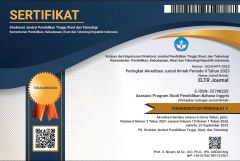IMPLEMENTING MOBILE COMPUTING EXERCISES BASED ON ANDROID IN CREATING IDEAS TO FACILITATE INDEPENDENCE LEARNING OF READING COMPREHENSION
Abstrak terlihat: 378 / PDF terunduh: 327DOI:
https://doi.org/10.37147/eltr.v1i2.10Keywords:
Mobile Computing Based on Android, Independent learning and Reading ComprehensionAbstract
Computer technology has been experiencing quite rapid development in which it, in turn, has also caused a change in the human lifestyle. Nowadays, a new trend in e-learning is known as Mobile Learning. The main research argues the need to implement online learning environments to better support the representation and sharing of factual, procedural, to build and develop m-learning that can be used as a flexible learning media and conceptual knowledge to develop students' implement capabilities and produces learning logical reasonable will be prepared based on the needs of development.
The implement-based research methodology explicates how to implement not only allowed more effective student representation and sharing of the different levels of knowledge required for abstraction to occur, but also enabled better teacher assessment and, hence, remediation also provides detailed guidance on creating interactive content (from the application of learning strategies and media to courseware development). The result obtained from this research is that 95% of the user from university students enjoy in using the application of mobile learning and it is only 5% does not enjoy. At last, it can be concluded that the use of the mobile learning application can make the learning process more flexible.
Downloads
References
Clark R.C., Mayer R.E., e-Learning and the Science of Instruction - Proven Guidelines for Consumers and Designers of Multimedia Learning, Second Edition, Pfeiffer 2005
Davidson-Shivers, Web-Bassed Learning: Design, Implementation, and Evaluation. New Jersey: Pearson Prentice Hall, 2006.
Gamma, E., Helm, R., Johnson, R., & Vlissides, J. (2008). Design Patterns: Elements of reusable object-oriented software, Reading, MA: Addison Wesley.
Lee, C.-S., Kolodner, J. L., & Goel, A. K. (2011). Guest Editorial - Creative Design: Scaffolding Creative Reasoning and Meaningful Learning. Educational Technology & Society, 14 (1), 1–2.
M. Rosenberg, E-learning: Strategies for delivering knowledge in the digital age, New York, NY: McGraw-Hill Companies, Inc. 2001, pp. 185–188.
Nurhayati., O. D., “Design of Information Technology in Enhancing the Quality of M-learning -Based Learning at Diponegoro University,” International Journal of Computer Science, vol. 10, no. 6, pp. 190–195, .
Pocatilu, P “Developing Mobile Learning Applications for Android using Web Services.,” Informatica Economica., vol. 14, no. 3, pp. 106–115, 2010.
See R.E. and Clark, R.C. (2005). e-Learning and the Science of Instruction: Proven Guidelines for Consumers and Designers of Multimedia Learning. 2nd edition. San Francisco: Pfeiffer
Downloads
Published
How to Cite
Issue
Section
License
Copyright (c) 2017 Lusy Tunik Muharlisiani

This work is licensed under a Creative Commons Attribution-ShareAlike 4.0 International License.











 ELTR Journal,
ELTR Journal, 